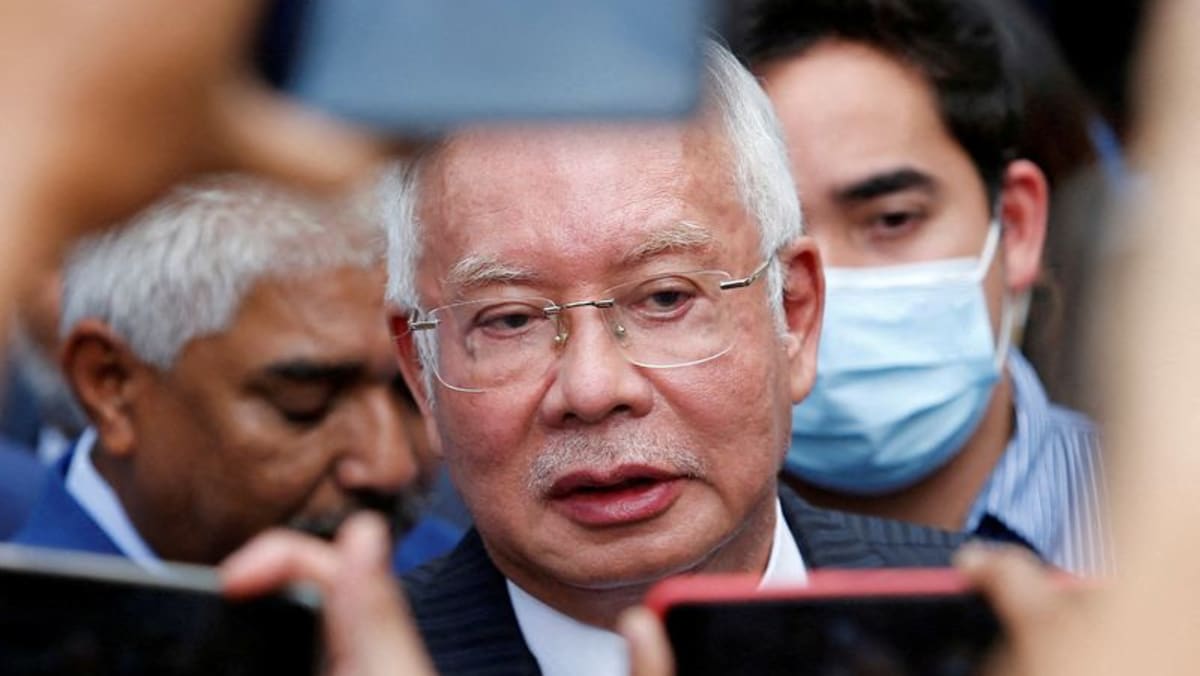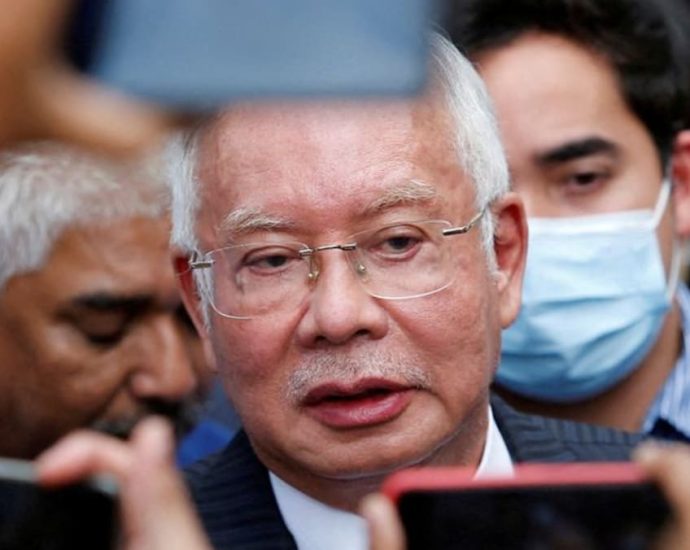Pink Line to resume full service
PUBLISHED : 31 Jan 2024 at 13:51

The Pink Line monorail will resume full service from Min Buri to Nonthaburi Civic Center on Thursday after its operator repaired a conductor rail that collapsed last month.
Inspecting the system on Tuesday, Deputy Transport Minister Surapong Piyachote said Pink Line developer and operator North Bangkok Monorail Co had completely repaired the conductor rail and the entire line was tested successfully on Wednesday.
At about 5am on Dec 24, 2023, a five-kilometre-long section of the conductor rail fell from the elevated structure of the Pink Line, from the Central Chest Institute of Thailand near the Khae Rai station to a pocket track (centre siding) near the Royal Irrigation Department station.
The conductor rail hit several parked vehicles on Tiwanon Road in the early hours of Christmas Eve.
Officials determined that the conductor rail was hit and dislodged when sheet piles were being lifted by cranes. An empty monorail train on a test run then pulled the rail down shortly before trial service was to start at 6am that day.
The 34-kilometre-long Pink Line links Bangkok’s northern district of Min Buri and Muang district of Nonthaburi to the west of the capital.
Competition watchdog begins in-depth review of Grab’s proposed Trans-cab acquisition

Grab and Trans-cab have argued that the acquisition will not result in a substantial lessening of competition, citing “minimal overlaps” between them; a lack of prohibitive barriers to entry; and a highly fragmented and competitive rental market.
On Oct 31, 2023, Grab proposed some commitments to address the competition concerns identified by CCCS.
“CCCS reviewed the commitments proposal and found that, without the benefit of an in-depth review, it was unable to conclude that the commitments proposal adequately addressed the competition concerns CCCS identified,” said the watchdog on Wednesday.
“For example, it did not adequately address the concern that the proposed acquisition may give Grab the ability and incentive to leverage its ownership of the Trans-cab fleet to induce Trans-cab drivers to use Grab’s ride-hail platform, whilst discouraging them from using rival ride-hail platforms.”
The tech firm’s proposed commitment duration of two years, as well as their self-policing monitoring mechanism, were also deemed to be insufficient, said CCCS, adding that Grab was informed on Nov 24, 2023 that it could not accept the proposal.
Grab had argued that the merger would ultimately benefit customers and improve driver earnings.
“Digitalising Trans-cab’s fleet will improve driver productivity and taxi availability so that consumers can get a ride more easily,” Grab said in October.
The company also said that Trans-cab drivers will still have the option of being on multiple ride-hailing platforms and pick up street hail rides.
China overtook Japan as world’s top vehicle exporter in 2023
TOKYO: China overtook Japan as the world’s biggest vehicle exporter last year, data from the Japan Automobile Manufacturers Association (JAMA) showed Wednesday (Jan 31). Japan shipped 4.42 million vehicles in 2023, the figures showed. That compared with 4.91 million exported by China, as reported by the China Association of AutomobileContinue Reading
What does Evergrandeâs liquidation mean for other property developers in China?

The liquidators could propose a new debt restructuring plan if it is determined that the Guangzhou-based firm has enough assets or if a white knight investor emerges. They could also refer suspected misconduct by directors to Hong Kong prosecutors.
The process, however, could be complicated, and face cross-jurisdictional issues as most of the developer’s assets are located in mainland China, said experts.
It is not clear whether the Hong Kong court order could be enforced onshore, Dr Wu told CNA’s Asia Now on Monday.
“Hong Kong and mainland China are two different jurisdictions, so this will be a challenge,” he said.
“If there’s no court in mainland China that actually recognises this Hong Kong court case, then perhaps there are limited things that the provisional liquidator in Hong Kong can do.
“(Even) if there is a court in mainland China that actually does recognise this court case, I think this will still be a long, drawn-out process.”
Imran Khan: Former Pakistan PM jailed another 14 years for graft

Imran Khan and his wife Bushra Bibi have been sentenced to 14 years in prison, a day after the former Pakistan prime minister was jailed for 10 years.
Khan, who was ousted as PM by his opponents in 2022, is already serving a three-year jail term after being convicted of corruption.
On Tuesday he was sentenced for leaking state secrets, and on Wednesday given another 14 years for a graft case.
Khan has said the numerous cases against him are politically motivated.
These latest convictions come just a week ahead of Pakistan’s national elections in which he is barred from standing.
It is believed that the sentences will be served concurrently. Khan has already been detained since last August when he was arrested.
His wife Bushra Bibi had been on remand during the trial – which pertained to allegations the couple had illegally sold state gifts they’d received for personal profit.
This breaking news story is being updated and more details will be published shortly. Please refresh the page for the fullest version.
You can receive Breaking News on a smartphone or tablet via the BBC News App. You can also follow @BBCBreaking on Twitter to get the latest alerts.
Related Topics
Former Malaysian premier Najib Razakâs jail term halved from 12 to 6 years, say official sources

KUALA LUMPUR: Former Malaysian prime minister Najib Razak’s jail sentence for corruption has been reduced from 12 to six years by the Pardons Board following its meeting on Monday (Jan 29), sources including senior government officials told CNA.
The decision by the board, which is headed by Malaysia’s king, includes a reduction of his RM210 million (US$44.4 million) fine to an unspecified amount, according to three separate sources who spoke on condition of strict confidentiality.
The partial royal pardon for his role in the 1Malaysia Development Berhad (1MDB) case comes after serving less than two years of his prison term.
The reduction means Najib is expected to complete his sentence in August 2028. But with parole for good behaviour, he could be out in August 2026 after serving two-thirds of the new jail term.
There has been feverish speculation about the pardon after Dr Zaliha Mustafa, Minister in the Prime Minister’s Department (Federal Territories) confirmed on Tuesday that the board members including herself had met on Monday. She said an official announcement by the Pardons Board will be made.
The meeting was one of Sultan Abdullah Ri’ayatuddin’s last official tasks before he stepped down as Malaysia’s king on Jan 31 and handed the role to Johor ruler Sultan Ibrahim Sultan Iskandar under the country’s unique rotation system for its nine royal state households.
CNA is contacting the Malaysian authorities for comment. Najib’s lead counsel Muhammad Shafee Abdullah said he has yet to be informed of any decision by the Pardons Board.
NAJIB’S INFLUENCE AND OUTSTANDING CHARGES
Najib, an ex-United Malays National Organisation (UMNO) president, is still believed to wield huge influence in the party, which is part of Prime Minister Anwar Ibrahim’s unity government.
He was Malaysia’s premier for nine years until May 2018 and its first PM to be imprisoned. He began serving his jail term in August 2022 after two failed appeals to overturn his conviction at a Malaysian High Court two years earlier.
The charges involved the transfer of RM42 million from SRC International, a former subsidiary of 1MDB, into his personal bank accounts in 2014 and 2015.
He was found guilty of three counts of criminal breach of trust, three counts of money laundering and one count of abuse of power by the High Court in July 2020, and was sentenced to 12 years in jail and fined RM210 million. The fine remains unsettled.
He is also facing several other charges in relation to the 1MDB scandal, including the laundering of RM27 million involving funds from SRC International.
Najib’s lawyers have applied to dismiss this money laundering case, and the court has said he can apply for an acquittal, or a discharge not amounting to an acquittal if prosecutors are not prepared to proceed with the trial in September, local media reported.
1MDB, Najib’s brainchild shortly after he became premier, turned into one of the biggest scandals to rock Malaysia and the international financial community. United States and Malaysian investigators estimate that more than US$4.5 billion was stolen from the fund and another US$1 billion flowed into accounts held by Najib.
Just days after Najib began serving his sentence at the Federal Prison of Kajang on the outskirts of Kuala Lumpur, he applied for a royal pardon.
CNA previously reported that Najib’s lead counsel Shafee filed a fresh application in early December last year for the Pardons Board to revisit his client’s clemency application.
This led to the change of heart among certain members of the Pardons Board, government officials close to the situation noted without elaborating. The application came before the Pardons Board in a meeting in December, but the matter was deferred to January.
Malaysia is a constitutional monarchy, giving the king the final word on the pardon of convicted criminals, a similar system that governs neighbouring Thailand.
Manager of lending firm arrested for stealing customers’ money
PUBLISHED : 31 Jan 2024 at 12:47

BURI RAM: The manager of a lending company has been arrested for stealing almost 200,000 baht from its customers’ accounts.
The manager allegedly used the documents of three customers to change their personal data, allowing him to obtain cash cards that were then used to withdraw money from the victims’ loan accounts.
Investigators from Provincial Police Region 3 and local police, armed with an arrest warrant issued by the Buri Ram Provincial Court, arrested a man identified only as Anurak, 32, the manager of a lending firm in Muang district on Wednesday, police said.
The arrest came after three people who were customers of the lending company filed a complaint with police at Muang police station that someone had used their names to apply for cash cards that were used to withdraw money they transferred to the company for loan repayments. This caused their outstanding debt balances to be inaccurate.
Almost 200,000 baht had been withdrawn from their loan accounts in December last year despite the fact that they had no cash cards to withdraw the money.
Following a police investigation, officers sought court approval to arrest Mr Anurak, who worked as the manager of the lending firm where the victims received loans.
Police said that on seeing the arrest warrant, Mr Anurak admitted to having withdrawn money from his customers’ loan accounts. Police searched his room and seized clothes he wore when going to withdraw cash from ATM booths, as captured in footage from closed-circuit television cameras.
A mobile phone and a pickup truck were also seized from him, but the cash cards he obtained under the victims’ names were not found. He claimed he had thrown them away and could not remember where.
During questionining, he said he had worked at the lending company since it was established. He later found a way to steal money from customers’ loan accounts by using the personal documents submitted to the firm. He had used those documents to change the customers’ mobile phone numbers and other personal data before applying for cash cards on the victims’ behalf. He then used the cards to withdraw money. He claimed he was motivated by informal debts that he was unable to pay.
Police charged him with theft and illegally using others’ electronic cards to cause damage to other people.
Sydney Harbour shark attack victim Lauren O’Neill thanks ‘heroic’ neighbours
 Supplied
SuppliedAn Australian woman attacked by a bull shark in Sydney Harbour has thanked her “heroic” neighbours for coming to her aid.
Lauren O’Neill was bitten during a sunset swim near a wharf on Monday.
The 29-year-old’s leg was severely injured but surgeons worked through the night to save it from amputation, according to Sydney’s Daily Telegraph.
In a statement on Wednesday, Ms O’Neill lauded the life-saving help offered by onlookers, medical staff and police.
She said she had been taking a “short dip” close to the shore in Elizabeth Bay after a hot day – as she often did – when she was attacked.
“She wishes to thank her heroic and very kind neighbours for the critical assistance they provided her,” said a statement released by the hospital where she is receiving care.
Local media have reported that the keen kayaker and swimmer lived near an ocean pool equipped with shark nets but often swam in the open water.
Witnesses have said they rushed to the scene and applied first aid after hearing her yelling. They helped Ms O’Neill out of the water and one woman – a vet – applied a tourniquet to stem the bleeding, something credited with potentially saving her life.
Ms O’Neill said she was “immensely grateful” to paramedics and police for their “swift and caring actions at the scene” as well as the medical teams treating her.
“Her likely full recovery is testament to their extraordinary skills,” the statement said.
She also thanked her loved ones and the public for their support, but requested privacy as she recovers.
Sydney Harbour is a well-known habitat for bull sharks, but attacks in the area are rare.
Experts have reiterated warnings to locals to stay out of the harbour on hot days and at dawn or dusk – times of greater shark activity.
Related Topics
SPCA sees ‘alarming increase’ in pet abandonment cases

Under the Animal and Birds Act, those found guilty of animal cruelty can be jailed for up to 18 months, fined up to S$15,000, or both. Repeat offenders can face a jail term of up to three years, a fine of up to S$30,000, or both. They may face stiffer punishment if they are employed in an animal-related business.
SPCA does not have enforcement powers under the Animals and Birds Act, but it refers serious cases to the Animal and Veterinary Service (AVS) or the police.
Calling on the public to report cases of animal cruelty and abandonment, SPCA said its inspectorate plays a vital role in investigating incidents.
It added: “Although the SPCA does not have the authority to enforce laws, prosecute offenders, or remove animals from their guardians, we play a critical role in the fight against animal cruelty by gathering credible witnesses and evidence, providing guidance on animal welfare issues and providing investigative support.”
The win-win way to avoid a Taiwan war – Asia Times
After the surprise January 26-27 meeting between US National Security Advisor Jake Sullivan and Chinese Foreign Minister Wang Yi, Taiwan independence remains the most problematic issue in US-China relations.
The Taiwan problem will remain, especially since the independence-supporting Democratic Progressive Party (DPP) held Taiwan’s presidency following the island’s recent election.
Although Washington underlined its long-standing policy against Taiwan independence in response to the DPP victory, more is needed to craft a balanced Taiwan policy to achieve American interests. Instead of words alone, the United States should put its One China policy into practice to boost cross-strait deterrence and avoid a war with China.
Critically, to assure Beijing and maintain the hope of a diplomatic resolution to the Taiwan question, Washington should more publicly assure Beijing that it would accept the peaceful reunification of China and Taiwan.
To his credit, US President Joe Biden indicated this to Chinese leader Xi Jinping during their November 2023 meeting in San Francisco. Not only should Biden and his successors restate this publicly, but US government agencies should also make this an official talking point for both bilateral and multilateral engagements.
Increasing awareness of US acceptance of peaceful reunification – through joint statements, communiques, and formal records – will encourage other countries to adopt similar policies and further assure Beijing of America’s intentions. When America speaks, the Western-leaning world listens.
Through Washington’s insistence, concern over China-Taiwan ties has found its way into multilateral and bilateral diplomacy. This subsequently led to an uptick in US, European, and Indo-Pacific engagement with Taiwan and interest in Taiwan policy. More official and active US acceptance of a peaceful reunification outcome could see the West, Japan and South Korea formally adopt the policy as their own.
Providing further assurance, the White House should make clear to both Congress and Beijing that the President has the sole Constitutional authority to recognize the sovereignty of states.
The White House Counsel and the State Department’s Office of the Legal Advisor should jointly release official guidance reinforcing this, specifically citing Zivotofsky vs Kerry – whereby the Supreme Court denied Congress has a right to recognize a state’s sovereignty through law. This would show China that when a US President says the United States opposes Taiwan’s independence, he or she means it.
Moreover, Washington should reverse its trend of official visits with Taiwan, which has worsened Taiwan’s security for the sake of symbolism.
To carry this out, the United States should return to conducting relations with Taiwan primarily through the American Institute in Taiwan. This would mean avoiding sending de jure US government officials to Taiwan and keeping relations unofficial, even though the Taiwan Travel Act allows up to the highest level of official visits.
Additionally, should Congress pass any law encouraging the Taipei Economic and Cultural Representative’s Office (TECRO) in Washington to change its name to the Taiwan Representative Office, the Department of State should convey the negative implications of a name change to convince TECRO to maintain the status quo.
The State Department should advise that a name change would likely lead to trade disruptions, Beijing doubling its efforts to poach Taiwan’s remaining diplomatic allies and increased military activity around the island.
It would also likely signal to China that peaceful reunification is a dead end with the United States effectively declaring it would recognize an independent Taiwan. Of course, this would mean force is the only path to reunification.
Returning to a more unofficial relationship with Taiwan and avoiding symbolic activities would undermine China’s talking points that the United States is supporting or encouraging Taiwan’s independence forces. As a result, it would reduce the primary necessity – from a Chinese perspective – to rely more on forceful means in dealing with Taiwan.
However, Washington should pair assurance to Beijing on Taiwan with Chinese concessions on areas of US interest. These could include accelerating nuclear arms talks, trade and economic policy reciprocity and curbing economic espionage. Advancement in any of these areas would be a major win for US vital interests – far more than the cost to reassure Beijing.
By actively reassuring China and the world of its opposition to Taiwan’s independence, the United States can prolong the cross-strait peace. Beijing would have less need to use coercive measures in its relations with Taiwan with restored mutual trust in US policy, which Chinese Premier Li Qiang emphasized during his 2024 World Economic Forum address.
Concurrently, Taipei would be further constrained to maintain the non-independence status quo and avoid symbolic activities that may promote ideas of sovereignty but harm security.
Despite a more active assurance policy, US efforts ultimately underpin its One China policy and the strategic ambiguity that has contributed to cross-strait peace for decades. This policy can work together with US commitments under the Taiwan Relations Act and the Six Assurances to create a more restraint-oriented Taiwan policy.
Taiwan is the likeliest flashpoint for a US-China conflict. Establishing acceptance of peaceful reunification as official policy, doubling down on opposition to Taiwan independence and restoring prior diplomatic practices are cheap means to deter a war over Taiwan. Now is the time to change course to reassure Beijing, before it is too late.
Quinn Marschik is a contributing fellow at Defense Priorities.










